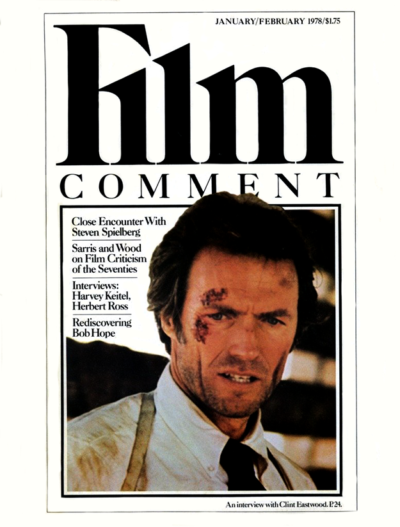FILM CRITICISM IN THE SEVENTIES
The Sixties saw the rise of a new breed of anti-establishment film critics, who championed movies as art, and their directors as auteurs. By now, the auteurists have become the establishment, to be challenged by newer, more contentious critics. We thought it time for the two leading auteurists of the Sixties to take stock. Andrew Sarris does so, and in a piece on the effect of an emerging gay consciousness on his work, Robin Wood reflects.
MIDSECTION: ACTING
Everybody does acting, but not too many write intelligently about it. Our new Midsection presents some provocative Notes on Acting by writer-director James Toback. Actor Harvey Keitel (starring in Toback’s new film, Fingers) has the insider’s view, which he shares with Stuart Byron in the interview. And, as a reminder that the performance begins only when the part is cast, Linda Rosenkrantz provides hundreds of examples of The Role That Got Away.
SPIELBERG’S CLOSE ENCOUNTER
In Hollywood, youth must be served—especially when a twenty-five-year-old directs a picture that grosses $300 million. Steven Spielberg, now 29, has moved from underwater to outer space with Close Encounters of the Third Kind. In an interview with Mitch Tuchman, Spielberg summarizes his spectacular career. And the equally spectacular Kenneth Anger (Scorpio Rising, Hollywood Babylon) tells of a strange encounter with Spielberg’s film, and decides He Is Not Alone.
ROSS AT THE TURNING POINT
Herbert Ross has a reputation as a fine director of actors (Shirley MacLaine in The Turning Point, Richard Dreyfuss in The Goodbye Girl) and an agreeable director for strong writers (Arthur Laurents, Neil Simon, Woody Allen). Critic Stephen Farber, in an article-interview, thinks Ross is something more . . . dare we whisper the word auteur?
JOURNALS
David Overbey from Paris. Brooks Riley from Telluride. Roger Ebert from his living room.
BOB HOPE
Forget the image of Hope as Toastmaster Jester to the Vietnam War, says Peter Kaplan. The man was funny. And so were his movies.
THE GODFATHER SAG-A
What TV did to the Corleones was an organized crime. By Carlos Clarens.
CLINT EASTWOOD
A conversation with Hollywood’s humpiest auteur. By Richard Thompson and Tim Hunter.
STERNBERG’S ANATAHAN
The director’s last film is a sound success. By Jonathan Rosenbaum.
HAWKS VS. DURGNAT
William Paul defends the late director, in a reply to Raymond Durgnat.
INDUSTRY
Hollywood’s most successful research ploy: bug the theater powder room. By Thomas Simonet.
BOOKS
Diane Jacobs makes a case for a Hollywood Renaissance; George Morris breaks the case.
INDEPENDENTS
Amos Vogel on the new documentaries.
BACKTALK
Handicapping the Oscars. What’s in store for Scarlett. How Menachem Begin got Ben Hecht blacklisted. Why Audrey Hepburn isn’t making movies.
BULLETIN BOARD




